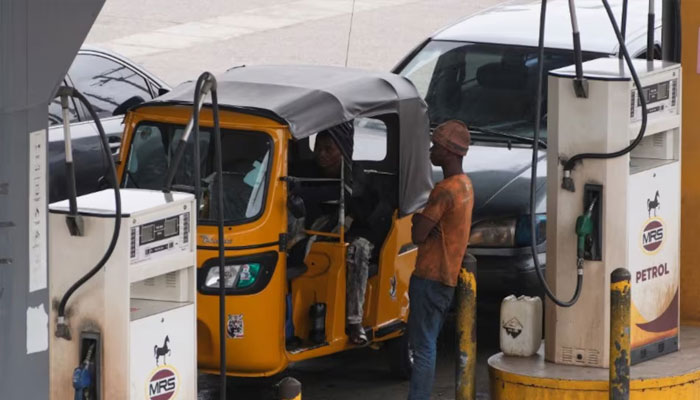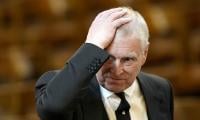In deluge of protests, fuel subsidies prove hard to abolish
LONDON: Like thousands of Nigerians and millions of others across the developing world, higher fuel costs have irked Antonia Arosanwo.
“I am angry”, the 46-year-old mother of five said at a bus stop in Lagos, the teeming commercial capital of Africa’s most populous nation.
Her journey from Ojuelegba, a bustling suburb just 8 miles north of Lagos’s business district, has more than doubled in price to 700 naira (45 US cents) since the government announced an end to fuel subsidies last year -- allowing petrol prices to triple.
Arosanwo’s anger mirrored that of thousands of other Nigerians, whose nationwide protests last week demanding protection from rocketing inflation, spreading hunger and dwindling jobs rattled the government.
Nearly all had one core complaint: fuel prices.Across Africa -- and a string of other emerging market nations -- debt-laden governments trying to shed costly fuel subsidies are running headlong into angry populations reeling from years of increasing living costs.
Egypt and Malaysia this year boosted prices to cut subsidy spending, while Bolivia’s President Luis Arce, who fended off an attempted coup in June, called this week for a referendum on fuel subsidies. The government expects gasoline and diesel subsidies to cost Bolivia some $2 billion this year.
Arce, like others, faces dollar shortages and a flagging economy.“Difficult moments require firm, mature, thoughtful decisions and human beings who do not falter in the face of adversity, and this is precisely a moment of this nature,” Arce said in a speech in the Bolivian city of Sucre.
But the smoke of protests is clouding governments’ hopes of ending fuel subsidies, as the same stagnating economic growth that’s punching a hole in budgets is making life harder for citizens.
Leaders in Angola and Senegal are, like Nigeria, struggling to cut them.“In a situation of cost-of-living crisis and high inflation, (more expensive fuel) becomes even unbearable,” said Bismarck Rewane, chief executive of the Financial Derivatives Co in Lagos and a government economics adviser.
Removing the subsidy, he said, must be phased in according to two principles – “one, what the government can afford (and) two, what the people can afford?”
INTO THE FIRE
Nearly every nation on earth has some form of energy subsidy, costs of which hit a record $7 trillion in 2022 -- a whopping 7.1 per cent of GDP -- according to the International Monetary Fund.
Experts slam subsidies as blunt-force tools that give more to wealthy car owners than to the poor - and that they are prone to corruption and bad for the environment.
The biggest spenders, according to the International Energy Agency, are Russia, Iran, China and Saudi Arabia -- countries that can, broadly, afford the costs. But for emerging countries, saddled with costly debt and still-high global interest rates, financing these is more punishing.
“It’s acute now, because countries have fiscal problems,” said Chris Celio, senior economist and strategist with ProMeritum Investment Management. “And so then the question is, why do you have fiscal problems? Well, one reason is because you have this hole in your budget going to something that’s inefficient ... and you’re having problems financing it.”
Nigeria’s President Bola Tinubu announced an end to subsidies after taking office last year. But when pump prices tripled, he froze them. And when the naira currency crashed, subsidies crept back -- despite higher pump prices.
UNPOPULAR POLICIES
Now, leaders mulling further price hikes are also nervously eyeing revolts elsewhere over unpopular economic policies. Bangladesh’s prime minister resigned after hundreds died protesting job quota changes, while Kenya’s president fired his cabinet and backtracked on tax hikes after deadly demonstrations in June.
“If there was a reluctance to increase fuel prices prior to the events in Kenya ... that reluctance, if anything, is probably even higher,” said Goldman Sachs senior economist Andrew Matheny.
“Politicians around the world are tuned to this cost of living crisis ... that probably does limit the willingness of policymakers to undertake reforms that, at least in the short term, might prove to be unpopular.”
-
 Prince William Always Ready To Step Up: ‘He’s Barely Able To Contain His Fury When Kate’s Involved’
Prince William Always Ready To Step Up: ‘He’s Barely Able To Contain His Fury When Kate’s Involved’ -
 Florida Woman ‘tricked Innocent Movers Into Helping Her’ $7k Burglary: Report
Florida Woman ‘tricked Innocent Movers Into Helping Her’ $7k Burglary: Report -
 Harry Deserves Top Protection As King Charles’ Son, Prince William’s Brother
Harry Deserves Top Protection As King Charles’ Son, Prince William’s Brother -
 Meghan Markle Receives Key Advice As Experts Warn She’s Doing Too Much
Meghan Markle Receives Key Advice As Experts Warn She’s Doing Too Much -
 Kelly Clarkson Weighs In On Life Without The Father Of Her Children
Kelly Clarkson Weighs In On Life Without The Father Of Her Children -
 Paul Mescal, Gracie Abrams Committed To 'long Distance' Relationship: Source
Paul Mescal, Gracie Abrams Committed To 'long Distance' Relationship: Source -
 Street Fight Turns Bloody As Innocent Bystander Shot In The Face
Street Fight Turns Bloody As Innocent Bystander Shot In The Face -
 Tom Blyth Shares His Two Cents On The Importance Of Rom Coms
Tom Blyth Shares His Two Cents On The Importance Of Rom Coms -
 Jennifer Lawrence Opens Up About Her Most Demanding Film Role
Jennifer Lawrence Opens Up About Her Most Demanding Film Role -
 Nikki Glaser Shares Set Of Rules For Roasting Stars At 'Golden Globes'
Nikki Glaser Shares Set Of Rules For Roasting Stars At 'Golden Globes' -
 Prince Harry Risks Overshadowing Invictus Games With Royal Drama
Prince Harry Risks Overshadowing Invictus Games With Royal Drama -
 Daily Fish Oil Supplements Intake May Reduce Cardiovascular Risks, Heart Problems
Daily Fish Oil Supplements Intake May Reduce Cardiovascular Risks, Heart Problems -
 Pamela Anderson Gets Honest About New Exciting Role
Pamela Anderson Gets Honest About New Exciting Role -
 Alexander Skarsgård Reveals Harsh Views On Fame
Alexander Skarsgård Reveals Harsh Views On Fame -
 Prince Harry’s Anxiety About Archie, Lilibet’s Safety In School Comes Out: ‘There’s Guns!’
Prince Harry’s Anxiety About Archie, Lilibet’s Safety In School Comes Out: ‘There’s Guns!’ -
 Charlie Hunnam Reveals Why He Has Stopped Reading Reviews: 'I Don't Need'
Charlie Hunnam Reveals Why He Has Stopped Reading Reviews: 'I Don't Need'




